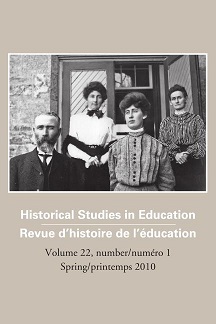Résumé
Ramsay Wright was appointed in 1874 to the University of Toronto’s Chair in Natural History through an advertised competition designed to replace patronage with adjudicating candidates on merit. An absence of transparency and inconsistencies in the outcome, however, provoke doubts that the process was pursued fairly to acquire the most qualified candidate. Premier Mowat passed over eminently-qualified Canadians for this inexperienced Edinburgh lab tutor. The Darwinian orientation of his education together with training in the German scientific research methods, although sub rosa criteria because of their political contentiousness, appear to have been decisive for Wright’s selection. From archival evidence this study contrasts the recently-enacted protocol for fair, objective faculty recruitment with the shadowy process through which Wright was chosen. Once installed, with sparkling lecturing skills and the benefit of mentoring, Wright sidestepped his modest research output to progress in administration. Passed over for Toronto’s presidency, he diverged to embrace a later-discredited aspect of evolution, advocating publicly for human eugenics. Wright retired to Oxford in 1912, after which the more engaging aspects of his persona were periodically burnished for the university’s commemorative contexts.
--
Ramsay Wright fut nommé titulaire de la chaire d’histoire naturelle de l’Université de Toronto en 1874, lors d’un concours public conçu pour remplacer le favoritisme par un processus de sélection basé sur les mérites des candidats. Cependant l’absence de transparence et des incohérences dans le résultat mirent en doute l’impartialité du processus de sélection. Le premier ministre Mowat préféra ce chargé de travaux pratiques inexpérimenté d’Édimbourg à des Canadiens éminemment qualifiés. L’orientation darwinienne de l’éducation de Wright et sa formation dans les méthodes de recherches scientifiques allemandes, bien qu’il s’agisse de critères confidentiels en raison de leurs caractères controversés, semblent avoir joué un rôle décisif dans le choix de Mowat. À partir de documents d’archives, cette étude oppose le nouveau protocole mis en place pour assurer un recrutement juste et objectif à l’obscur processus par lequel Wright fut sélectionné. Une fois installé, celui-ci se révéla un conférencier brillant et il compensa son modeste rendement de chercheur en progressant dans l’administration.
